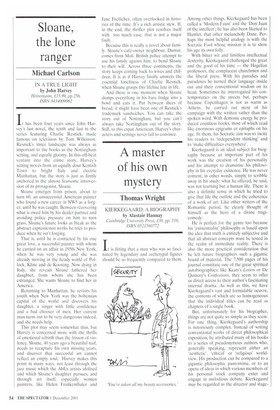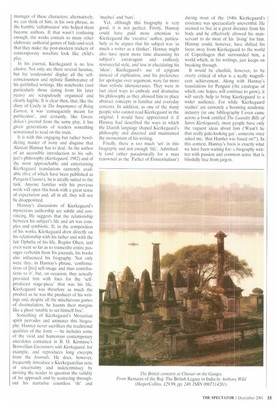A master of his own mystery
Thomas Wright
KIERKEGAARD: A BIOGRAPHY by Alastair Hannay Cambridge University Press, ,60, pp. 510, ISBN 0521560772 It is fitting that a man who was so fascinated by legendary and archetypal figures should be so frequently compared to them.
Among other things, Kierkegaard has been called a 'Modern Faust' and the 'Don Juan of the intellect'; he has also been likened to Hamlet, that other melancholy Dane. Perhaps the most helpful analogy is with the Socratic Fool whose mission it is to show his age its own folly.
With bitter wit and limitless intellectual dexterity, Kierkegaard challenged the great and the good of his time — the Hegelian professors, the complacent churchmen and the liberal press. With his parodies and paradoxes he turned their language inside out and their conventional wisdom on its head. Sometimes he interrogated his contemporaries on the streets but, perhaps because Copenhagen is not as warm as Athens, he carried out most of his campaign with the written rather than the spoken word. With demonic energy he produced countless books, most of which read like enormous epigrams or epitaphs on his age. In them, his Socratic aim was to incite his readers to 'independent thinking' and to 'make difficulties everywhere'.
Kierkegaard is an ideal subject for biography because an important part of his work was the creation of his personality and his attempt to dramatise his philosophy in his everyday existence. He was never content, in other words, simply to scribble away in his study: what he offered, he said, was not learning but a human life. There is also a definite sense in which he tried to give that life the outline and the coherence of a work of art. Like other writers of the Romantic period, he clearly thought of himself as the hero of a divine tragicomedy.
He is perfect for the genre too because his 'existentialist' philosophy is based upon the idea that truth is entirely subjective and that all abstract concepts must be tested in the realm of immediate reality. There is also the more practical consideration that he left future biographers such a gigantic hoard of material. The 7,500 pages of his journal constitute one of the great spiritual autobiographies; like Keats's Letters or De Quincey's Confessions, they seem to offer us direct access to their author's fascinating internal drama. As well as this, we have Kierkegaard's vast and formidable oeuvre, the contents of which are so homogeneous that the individual titles can be read as chapters of a single book.
But, unfortunately for his biographer, things are not quite so simple as they seem. For one thing, Kierkegaard's authorship is notoriously complex. Instead of writing conventional works of direct philosophical exposition, he attributed many of his books to a series of pseudonymous authors who, generally speaking, represent either an 'aesthetic', 'ethical' or 'religious' worldview. His production can be compared to a gigantic philosophic pantomime, or to an opera of ideas in which various members of his personal stock company enter and engage in melodious debate. Kierkegaard may be regarded as the director and stage manager of these characters; alternatively, we can think of him, in his own phrase, as the humble 'collaborator' who helped them become authors. If that wasn't confusing enough, the works contain so many other elaborate authorial games of hide-and-seek that they make the post-modern trickery of contemporary novelists look like child's play.
In his journal, Kierkegaard is no less elusive. Not only are there several lacunae, but his 'confessions' display all the selfconsciousness and stylistic flamboyance of his published writings. His notebooks (and particularly those dating from his later years) are scrupulously organised and clearly legible. It is clear then, that, like the diary of Cecily in The Importance of Being Earnest, it was 'consequently meant for publication', and certainly, like Gwendolen's journal from the same play, it has given generations of readers something sensational to read on the train.
It is with this engaging but rather bewildering master of irony and disguise that Alastair Hannay has to deal. As the author of an accessible introduction to his subject's philosophy (Kierkegaard, 1982) and of the most approachable and entertaining Kierkegaard translations currently available (five of which have been published as Penguin Classics), he is ideally suited to the task. Anyone familiar with his previous work will open this book with a great sense of expectation and, all in all, they will not be disappointed.
Hannay's discussions of Kierkegaard's mysterious authorship are subtle and convincing. He suggests that the relationship between his subject's life and art was complex and symbiotic. If, in the composition of his works, Kierkegaard drew directly on his relationship with his father and with the fair Ophelia of his life, Regine Olsen, and even went so far as to transcribe entire passages verbatim from his journals, his books also influenced his biography. Not only were they, in Hannay's phrase, 'confirmations of [his] self-image and thus contributions to it'. but, on occasion, they actually provided him with lines for the 'selfproduced stage-piece' that was his life. Kierkegaard was therefore as much the product as he was the producer of his writings and, despite all the mischievous games of dissimulation, he haunts their margins like a ghost 'unable to set himself free'.
Something of Kierkegaard's Mozartian spirit pervades and animates this biography. Hannay never sacrifices the traditional qualities of the form — he includes some of the vivid and humorous contemporary anecdotes contained in B. H. Kirmmse's Boswellian Encounters with Kierkegaard, for example, and reproduces long excerpts from the Journals. He does, however, frequently introduce a Kierkegaardian note of uncertainty and indeterminacy by inviting the reader to question the validity of his approach and by scattering throughout his narrative countless 'ifs' and 'maybes' and 'buts'.
Yet, although this biography is very good, it is not perfect. Firstly, Hannay could have paid more attention to Kierkegaard the 'creative' author, particularly as he argues that his subject was 'as much a writer as a thinker'. Hannay might also have spent more time discussing his subject's extravagant and endlessly resourceful style, and less in elucidating his 'ideas'. Kierkegaard's use of epigram instead of explication, and his preference for apologue over argument, were far more than stylistic idiosyncrasies. They were in fact ideal ways to embody and dramatise his philosophy as they allowed him to place abstract concepts in familiar and everyday contexts. In addition, as one of the many people who cannot read Kierkegaard in the original. I would have appreciated it if Hannay had described the ways in which the Danish language shaped Kierkegaard's philosophy and directed and maintained the momentum of his writing.
Finally, there is too much 'art' in this biography and not enough 'life'. Admittedly (and rather paradoxically for a man renowned as the 'Father of Existentialism') during most of the 1840s Kierkegaard's existence was spectacularly uneventful. He seemed to live at a great distance from his body and he effectively allowed his manservant to do most of his 'living' for him. Hannay could, however, have shifted his focus away from Kierkegaard to the world of Copenhagen that surrounded him, a world which, in his writings, just keeps on breaking through.
It would be churlish, however, to be overly critical of what is a really magnificent achievement. Along with Hannay's translations for Penguin (the catalogue of which, one hopes, will continue to grow), it will surely help to bring Kierkegaard to a wider audience. For while `Kierkegaard studies' are currently a booming academic industry (in one bibliography I even came across a book entitled The Launch)/ Bills of Soren Kierkegaard), most people have only the vaguest ideas about him (`Wasn't he that really pale-looking guy', someone once asked me, 'that Hamlet was based on?'). In this context, Hannay's book is exactly what we have been waiting for: a biography written with passion and common sense that is blissfully free from jargon.





















































































 Previous page
Previous page